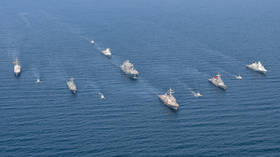US Navy expert laments ‘Slav’ incompetence of new NATO navies in scary Russia essay

NATO’s Eastern European member states have terrible navies that suffer from “legacy concepts” and equipment and can’t do much against Russia, a prominent professor lamented, asking the US Navy to do something about it.
Though the Adriatic Sea is a “NATO lake” and the alliance’s expansion in the Baltics and the Black Sea has brought it to Russia’s doorstep, the navies acquired along the way are pretty much useless, argued Thomas-Durell Young, a lecturer at the Naval Postgraduate School in Monterey, California.
Young’s article, titled ‘NATO’s selective naval blindness’ and published in the most recent issue of the Naval War College Review, makes the case that the situation is “both serious and desperate,” and that the navies of Poland, Latvia, Lithuania, Estonia, Romania, Bulgaria, Croatia, Slovenia, Albania and Montenegro all suffer from not just old ships but “legacy concepts” when it comes to sea power.
Also on rt.com US destroyer enters Black Sea ‘to support regional partners’, Russia sends ship to ‘monitor’Much of the 29-page paper is written in dense Pentagon-speak, but Young’s argument can be distilled thus: These navies have old or no warships, sensors or weapons, lack “adequate training concepts” or funding, and do not understand the Western concept that a navy should be at sea, rather than just preparing to sail.
All of these countries treat their navies as “tactical appendages” to the rest of the armed forces, with headquarters in a port rather than in the capital – with the notable exception of Romania, Young writes.
New policies—starting from a tabula rasa.
The answer, according to him, is a complete overhaul, scrapping not just old ships but old structures and practices, to rebuild them along Western lines so they could free up “the more capable Italian and Hellenic navies to carry out blue-water operations in support of Western objectives farther afield.”
Also on rt.com ‘They’re good help’: Russia comments on big NATO Black Sea drills as it holds own exercise (VIDEOS)This is admittedly difficult to do, as the countries in question are poor and unable to spend much on their militaries. Meanwhile, none of the billions of dollars the US has earmarked for beefing up NATO since 2014 have gone to navies, Young notes.
Attempting to explain the problematic “legacy concepts” that plague these navies, Young argues that, “in central and eastern Europe there is an odd absence of either a conceptual understanding of or linguistic cognate for capability. In some Slavic languages this is defined as potential, which misses the fundamental meaning of such a key concept of modern Western military planning and operations.”
Unfortunately for Young, the Baltic States are not Slavic. Neither are Albania or Romania. Nor is there confusion between “capability” and “potential” in any of the Slavic languages spoken in Bulgaria, Croatia, Montenegro, Poland and Slovenia.
Also on rt.com Russian warships escort 2 US destroyers in Baltic SeaHe also notes that previous Western “assistance policies and programs have been ineffective.” Perhaps that is experience speaking, as his NPS biography indicates Young has personally overseen “comprehensive defense planning and change management projects” in Estonia, Bulgaria and Montenegro, as well as non-NATO members Moldova, Ukraine and Serbia, for the past 20 years.
Think your friends would be interested? Share this story!














